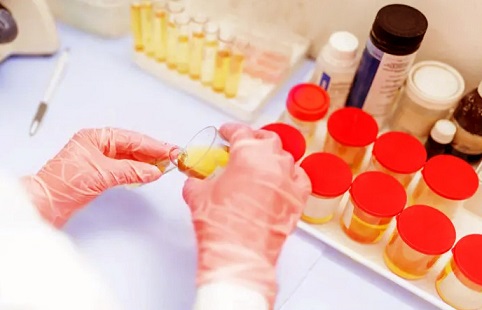Nikhil Prasad Fact checked by:Thailand Medical News Team Dec 23, 2024 1 year, 3 weeks, 5 days, 23 hours, 10 minutes ago
Medical News: The global COVID-19 pandemic has compelled researchers worldwide to explore new diagnostic and prognostic tools. Among these, the analysis of urine has emerged as a significant area of study. Unlike other biological samples, urine offers distinct advantages due to its non-invasive collection process, lower risk of infection, and the potential for frequent and large-volume sampling. Researchers from the University of Alicante in Spain, including Jennifer Narro-Serrano and Frutos Carlos Marhuenda-Egea, have highlighted the utility of urine in identifying critical biomarkers related to COVID-19.
 Urinary Biomarkers for COVID-19
Urinary Biomarkers for COVID-19
Urine serves as a reservoir of biochemical information. Its composition can reflect the body’s metabolic state and provide insights into systemic health. Integrating omics technologies - which include metabolomics, proteomics, and lipidomics - with clinical analyses has opened new doors for understanding the complexities of COVID-19. This
Medical News report delves into findings from various studies that used urine samples to uncover biomarkers indicative of COVID-19 severity, progression, and prognosis.
A Comprehensive Review of Urinary Biomarkers
Narro-Serrano and Marhuenda-Egea conducted an extensive review to compile data on urinary biomarkers related to COVID-19. After analyzing 913 studies, they identified 45 articles that met their stringent inclusion criteria. These studies emphasized the potential of urine as a diagnostic medium for COVID-19. The researchers observed that urinary biomarkers, such as proteins, amino acids, citric acid, and ketone bodies, could provide significant insights into the disease’s impact on the body.
Biomarkers like kynurenine, neopterin, glucose, and total proteins stood out in the findings. These markers reflect the body’s inflammatory and immune responses, renal function, and overall metabolic stress during COVID-19. By using urine as a non-invasive diagnostic medium, researchers aim to develop tools that could assist in early detection, monitor disease progression, and assess the likelihood of severe outcomes.
Key Findings and Their Implications
The studies included in the review demonstrated how COVID-19 affects multiple systems in the body. Urinary biomarkers revealed disruptions in metabolic pathways, immune responses, and kidney function. Some of the critical findings include:
-Proteinuria and Aminoaciduria: Elevated levels of proteins and amino acids in urine indicate kidney dysfunction. This condition stems from the virus’s attack on ACE2 receptors in renal tissues, coupled with systemic inflammation and endothelial damage.
-Ketone Bodies and Citric Acid: Increased levels of ketone bodies suggest metabolic stress, while reduced citric acid points to mitochondrial dysfunction. Both markers reflect the body’s struggle to maintain energy homeostasis during infection.
-Kynurenine Pathway Activation: Elevated kynurenine leve
ls and the kynurenine-to-tryptophan ratio (KTR) highlight immune activation and systemic inflammation. These markers are linked to severe complications such as acute kidney injury (AKI) and long-COVID syndrome.
-Neopterin and Hypoxanthine: Neopterin levels, a marker of immune system activation, are significantly higher in patients with poor prognosis. Similarly, hypoxanthine levels - key indicators of cellular stress - fluctuate during the disease’s progression, reflecting metabolic imbalances.
Advancing Diagnostic and Prognostic Tools
The findings underscore the potential of urinary biomarkers in addressing some of the challenges associated with COVID-19 diagnosis and management. Unlike traditional methods such as RT-PCR and serological tests, urine-based diagnostics could offer a broader perspective on the disease’s systemic effects. Moreover, by combining clinical and omics data, researchers can develop comprehensive diagnostic panels that integrate biomarkers reflecting inflammation, metabolism, and kidney function.
The research also highlights the limitations of current methodologies. Variations in analytical techniques, sample preparation, and population diversity have led to inconsistencies across studies. For instance, different studies reported varying levels of sensitivity and specificity for the same biomarkers, complicating the standardization of diagnostic thresholds.
The Road Ahead
As COVID-19 continues to evolve, so must our understanding of its biomarkers. Future research should prioritize standardizing protocols for urine collection and analysis. Moreover, expanding the scope of studies to include diverse populations, such as asymptomatic individuals and pediatric patients, will enhance the applicability of findings.
Researchers also advocate for the integration of multi-biomarker panels. By combining markers like kynurenine, neopterin, and ketone bodies, diagnostic tools can achieve greater accuracy and reliability. These panels could potentially aid clinicians in early detection, risk stratification, and long-term monitoring of COVID-19 patients.
Conclusion
The exploration of urinary biomarkers for COVID-19 represents a promising frontier in medical diagnostics. By offering a non-invasive, cost-effective, and comprehensive approach, urine-based tests could revolutionize how we detect and manage this disease. However, challenges related to methodological standardization and population diversity must be addressed to realize their full potential.
The study findings were published in the peer-reviewed journal: Metabolites.
https://www.mdpi.com/2218-1989/14/12/724
For the latest COVID-19 News, keep on logging to Thailand
Medical News.
Read Also:
https://www.thailandmedical.news/news/university-of-michigan-develops-new-urine-test-that-detects-high-grade-prostate-cancer-as-an-alternative-to-biopsies
https://www.thailandmedical.news/news/new-urine-test-for-early-lung-cancer-detection-shows-promise
https://www.thailandmedical.news/news/kidney-stones-new-faster-urine-diagnostics-for-kidney-stone-sufferers
https://www.thailandmedical.news/news/prostate-cancer-news-korean-researchers-develop-faster-and-accurate-urine-based-diagnostic-platform-for-detecting-prostate-cancer
